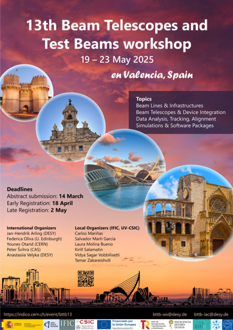Speaker
Description
Monolithic Active Pixel Sensors (MAPS) fabricated using advanced CMOS imaging processes represent the ideal candidate for vertex detectors and trackers in future lepton colliders, offering high circuit densities, low material and power budgets.
The OCTOPUS project, developed within the DRD3 collaboration, aims to simulate, develop, and evaluate fine-pixel monolithic sensors based on the 65 nm TPSCo process. In line with the requirements of vertex detectors for major lepton collider proposals, the main objective is to realize a vertex sensor demonstrator with a spatial resolution of 3 µm, a temporal resolution below 10 ns, a total material budget of 50 µm silicon, and an average power consumption below 50 mW/cm². The project timeline features a gradual approach that allows sensor performance to be adapted to future developments of the European Strategy for Particle Physics (ECFA). As an intermediate step, the project involves the development of a new generation high-resolution sensors for beam telescopes at DESY and CERN.
The contribution will present the objectives, structure, and preliminary results of the OCTOPUS project. The outcomes of simulations conducted within the project and connections with previous studies will be discussed.
